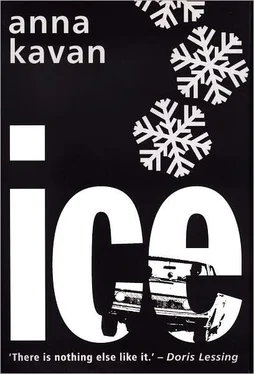Global conditions were worsening. There was no sign of destruction coming to a halt, and its inexorable progress induced general demoralization. It was more impossible than ever to find out what was really happening, impossible to know what to believe. No reliable source of information existed. Very little news of any description came from abroad; none whatsoever from once-prominent states which had simply dropped out of existence. More than any other single factor, it was the implacable spread of these unnerving areas of total silence that undermined public morale.
In certain countries civil unrest had resulted in the army taking command. A world-wide swing towards militarism had taken place during recent months, with deplorable and brutalizing effects. Frequent clashes occurred between civilians and the armed forces. The killing of police and soldiers, with retributory executions, had become commonplace.
As was to be expected, in the absence of any genuine news, fantastic rumours kept circulating. Monstrous epidemics, appalling famines, were said to have broken out in remote districts, fearsome deviations to have occurred from the genetic norm. Stocks of thermo-nuclear weapons, previously supposed to have been destroyed, were periodically reported to be in the possession of this or that power. Persistent rumours concerned the existence of a self-detonating cobalt bomb, timed, at a pre-set, unknown moment, to destroy all life, while leaving inanimate objects intact. Spying and counter-spying went on everywhere. There were growing acute shortages in all countries, food riots followed as a matter of course. The lawless element in the population was much in evidence, decent people were terrorized. The death penalty imposed for looting had little or no effect as a deterrent.
I got news of the girl indirectly. She was alive, in a certain town, in another country. I was almost sure the place was in the area of immediate danger, though there was no means of checking the point, since all reference to the advancing ice was forbidden. By intense persistence and extensive bribery, I managed to board a ship travelling in that direction. The captain wanted to make money fast, and for a large sum agreed to put in at the port I named.
We arrived. It was early morning, unbelievably cold, dark when it should have been light. No sky, no clouds, they were hidden by falling snow. It was not a morning like other mornings, but what it was: an unnatural freezing of day into darkness, spring into arctic winter. I went to say goodbye to the captain, who asked if I had changed my mind about going ashore. I said I had not. ‘Then for God’s sake get going. Don’t keep us hanging about.’ He was angry, antagonistic. We parted without more words.
I went on deck with the first officer. The air stung like acid. It was the breath of ice, of the polar regions, almost unbreathable. It scarified the skin, seared the lungs; but the body quickly adjusted itself to this stringency. The density of the snow created a curious foglike gloom in the upper air. Every thing was obscured by the small flakes falling ceaselessly out of the shrouded sky. The cold scalded my hands when I collided with iced-up parts of the ship’s superstructure, which only became visible when it was too late to avoid them. In the silence I noticed a rhythmic vibration below, and spoke to my escort: ‘The engines; they haven’t stopped.’ For some reason it seemed surprising. ‘You bet they haven’t. The skipper can’t wait to turn the ship round. He’s been cursing you for days for making us put in here.’ The man showed the same antagonism as the captain, plus a disagreeable curiosity which came out now. ‘Why the devil have you come, anyhow? ‘That’s my business.’ In unfriendly silence we reached the rail. It was cased in thick ice, a rope ladder dangling from it towards the sound of a motor running below. Before I had time to look down, he swung his leg over. ‘Harbour’s frozen. We’ve got to put you ashore by launch.’ While he quickly descended with practised ease, I followed more awkwardly, clinging on with both hands, blinded by the snow. I did not see who pulled me into the rocking launch, or who pushed me towards a seat as it immediately shot forward. Travelling at full speed, it plunged and reared continually like a bucking horse, sheet of spray flew over the roof of the little cabin. There was too much noise for voices to be audible; but I could feel the almost murderous hostility of those on board, all hating me for keeping them here in danger when they might have been on the way to safety. To them my behaviour must have seemed perverse and utterly senseless. I began to wonder myself whether it made any sense, sitting huddled up in my coat, in the brutal paralyzing cold.
A sudden long-drawn-out yell startled me; it was really more of a howl. The officer jumped up, shouted back through a megaphone, then resumed his seat with the words: ‘One way traffic.’ Seeing that I did not understand, he added, ‘Plenty going the other way,’ and pointed ahead.
A confused indistinct commotion revealed itself as a ship, motionless in the midst of the feverish activity of small boats seething round it. In frantic competition, they fought to get near enough for their occupants to climb aboard. There was not room for all. Spectators crowded the rails of the ship as if at a race course, watching the collisions and capsizings below. Those in the boats had probably lived easily and been unaccustomed to danger, for they battled clumsily for their lives, with a sort of headlong terror, wasting their strength in useless jostling and surging. One boat floated upside down, surrounded by frenzied hands and arms struggling out of the water. The people in the next boat swarmed over it, hit out, kicked, stamped on the clinging hands, beat off the drowning. Even the most powerful swimmer could not survive long in that freezing sea. Several of the overcrowded unskillfully handled boats turned over and sank. Some broke up after colliding. In those that remained afloat, the passengers crushed and trampled each other in senseless panic, drove off clutching swimmers with oars. People already dying were battered and beaten. The muffled uproar of screams, thuds, splashes, continued long after the scene was hidden behind the snow. I recalled polite voices announcing over the air that people were desperate, fighting to get away from the threatened countries to safer regions.
The frozen harbour was a grey-white expanse, dotted with black abandoned hulks, embedded immovably in the ice. Banks of solid ice edged the narrow channel of blackish water, fringed with grinning icicle-teeth. I jumped ashore, snow blew out in great fans, the launch disappeared from sight. There were no goodbyes.
It could have been any town, in any country. I recognized nothing. Snow covered all landmarks with the same white padding. Buildings were changed into anonymous white cliffs.
A confused disturbance, shouts, the noise of wood splintering and glass breaking came from one of the streets where looting was going on. A crowd had broken into the shops. They had no leader, no fixed objective. They were just a disorderly mob surging about in search of excitement and booty, frightened, hungry, hysterical, violent. They kept fighting among themselves, picking up anything that could be used as a weapon, snatching each other’s spoils, taking possession of all they could lay hands on, even the most useless objects, then dropping them and running after some other plunder. What they could not take away they destroyed. They had a senseless mania for destruction, for tearing to shreds, smashing to smithereens, trampling underfoot.
A senior army officer appeared in the street and blew a whistle to summon the police. Striding towards the looters, he shouted orders in a fierce military voice, blew repeated blasts on the whistle. His face was dark with rage, framed by the astrakan collar of his fine overcoat. The main mass of the crowd fled at the sight of him. But some, bolder than the rest, stayed skulking among the wreckage. Furious, he strode towards them, threatened them with his cane, shouted to them to clear off, swore at them. They took no notice at first; then formed a rough circle, rushed at him from several points simultaneously, in groups of three or four together. He pulled out his revolver, fired it over their heads. A mistake: he should have fired at them. They swarmed round him, trying to snatch the weapon. The police were a long time coming. There was a scuffle. In the course of it, either by accident or intention, the gun was dropped through a grating. Its owner was a man in the late fifties, tall, vigorous. But I could see him panting. They were young toughs with faces of a sinister blankness. They attacked cunningly, with bits of metal and broken glass, pieces of smashed furniture, whatever came to hand. He fended them off with his cane, keeping his back to a wall. Their numbers and their persistence were gradually wearing him down; his movements were getting slower. A stone was thrown. Then a shower of stones. One of them knocked his cap off. The sight of his hairless skull produced ribald shouting, and for a second he seemed disconcerted. They took advantage of this, closed in, set on him like a pack of wolves. Blood trickling down his face, back to the wall, he still managed to fight them off. Then I saw something flash: someone had used a knife. Others followed suit. He clutched his chest, blindly staggered forward. The moment he left the wall he was done for, they were on him from every side. They knocked him down, sprang on top of him, tore his coat off, beat his head on the frozen ground, stamped on him, kicked him, slashed his face with chains. Finally he lay still on the snow. He had had absolutely no chance. It was murder.
Читать дальше












